Our Advocacies
WOSCONET (Women Support Women Community Network) is a women-led organization committed to advancing gender equality, inclusive governance, and socio-economic development. Founded with the vision of complementing governmental and non-governmental efforts, WOSCONET aligns its programs with the United Nations Sustainable Development Goals (SDGs), particularly those focusing on gender equality, education, health, and social inclusion.
The organization’s advocacy strategy is rooted in grassroots mobilization, policy engagement, and strategic partnerships. Each advocacy area reflects WOSCONET’s commitment to addressing the unique challenges faced by women, children, youth, and marginalized groups in Nigeria. Through community outreach, awareness campaigns, and institutional collaborations, WOSCONET creates platforms for empowerment, inclusion, and systemic change.
This document outlines ten key advocacy priorities that define WOSCONET’s mission. Each area represents a critical pillar in the organization’s drive to build resilient communities, strengthen democratic participation, and empower individuals—especially women and girls—to lead lives of dignity, opportunity, and impact.
Promoting Women's Inclusion in Governance
WOSCONET advocates for equitable female representation in governance. Through voter education (e.g., during the 2023 Nigerian elections), the organization has equipped women to understand and assert their democratic rights. It calls for gender quotas and gender-sensitive policies in political spaces, working alongside government agencies and civic groups to create inclusive leadership pipelines.
Civic education workshops for women
Leadership training for aspiring female politicians
Community dialogues on women’s political inclusion
Advancing Gender Equality and Women’s Empowerment
This pillar supports women’s access to education, training, and economic resources. WOSCONET designs community-based initiatives to dismantle barriers like cultural norms, gender roles, and limited opportunity structures. Its programs are built to highlight women as transformative agents capable of driving development at all levels of society.
Access-to-finance and business support clinics
Gender equality sensitization campaigns in rural communities
Skills acquisition and entrepreneurship training for women and girls
Combating Sexual and Gender-Based Violence (SGBV)
WOSCONET tackles SGBV through awareness campaigns, survivor support, and advocacy for stronger legal protections. It also engages communities to shift harmful societal norms. Through these efforts, it fosters safer environments for women and girls while promoting responsive and survivor-centric institutions.
SGBV awareness campaigns and legal literacy sessions
Establishment/support of survivor safe spaces
Training of community SGBV response volunteers
Promoting Menstrual Hygiene as Part of Sanitation
Menstrual health is addressed as both a human rights issue and a key component of WASH (Water, Sanitation, and Hygiene). WOSCONET’s activities include sensitization programs, distribution of hygiene products, and policy advocacy to integrate menstrual health into broader sanitation strategies and reduce taboos.
Free sanitary pad distribution and hygiene kits
Menstrual health education in schools and communities
Advocacy for menstrual hygiene inclusion in WASH policies
Inclusive Health Access and Awareness Initiative
WOSCONET runs health awareness campaigns to inform women and marginalized groups about critical health issues. It advocates for healthcare systems that are not only inclusive and gender-sensitive but also physically and financially accessible to vulnerable populations.
Mobile clinics and health outreach programs
Maternal and child health awareness campaigns
Engagement with policymakers on inclusive health policy reforms
Disability Inclusion and Empowerment Drive
Through regular outreach (e.g., distribution of white canes), WOSCONET addresses the specific needs of people with disabilities. The organization partners with others to promote disability-inclusive policies and campaigns to foster societal empathy, accessibility, and independence for all.
Assistive device distribution (e.g., white canes, mobility aids)
Disability rights awareness and training
Advocacy for accessible public infrastructure and services
Children’s Rights and Social Inclusion Project
WOSCONET pushes for policies and programs that safeguard children’s rights—especially in education, health, and protection. Their initiatives ensure vulnerable children, particularly girls and those with disabilities, are included in society and afforded equal developmental opportunities.
School outreach on children's rights and responsibilities
Community inclusion programs for children with disabilities
Advocacy for child protection and education policies
Youth & Girl Child Leadership Development Program
WOSCONET believes youth are central to societal transformation. Programs focus on mentorship, leadership, education, and life skills for young people, with tailored interventions to protect and elevate the girl child. These efforts are designed to cultivate a new generation of socially conscious leaders.
Mentorship and leadership camps for girls and young women
School-based clubs for youth development and advocacy
Girl Child Education Advocacy Week
Clean Water & Inclusive Sanitation Campaign (WASH)
Aligned with SDG 6, WOSCONET champions gender-responsive WASH programs. These include infrastructure for clean water and sanitation with a focus on menstrual hygiene. The network promotes public-private partnerships to scale these solutions in underserved communities.
School outreach on children's rights and responsibilities
Community education on hygiene and safe water practices
Stakeholder dialogues on integrating menstrual hygiene in WASH planning
Strategic Partnership & Impact Networking Forums
Recognizing that collaboration multiplies impact, WOSCONET actively builds networks with international NGOs, government agencies, and grassroots organizations. These partnerships are used to mobilize resources, share knowledge, and launch joint campaigns for women and child welfare.



